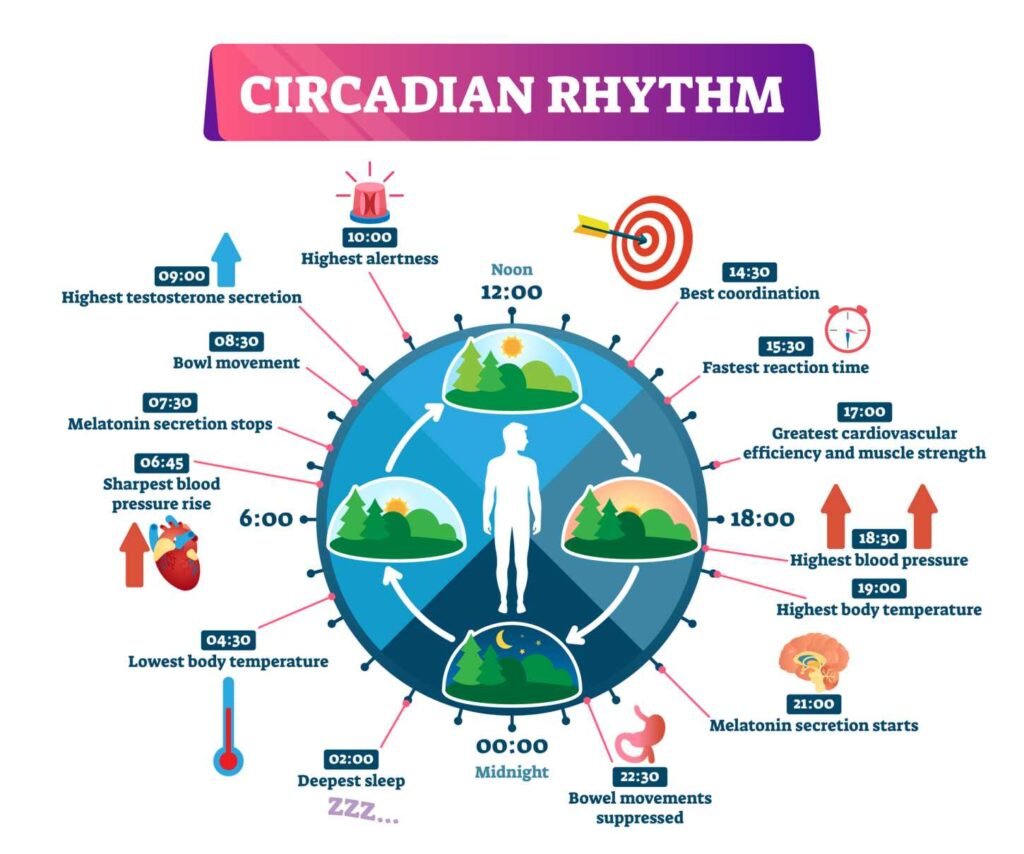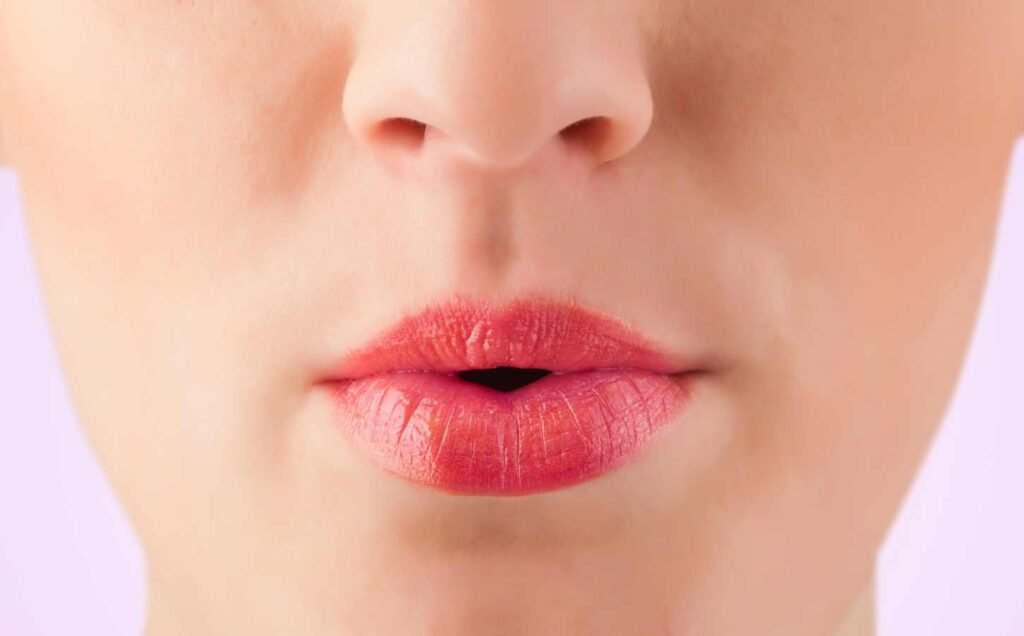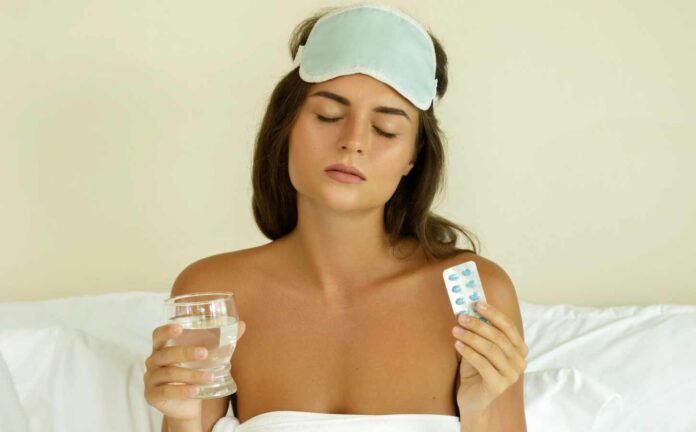Circadian rhythm sleep disorders are a group of sleep disorders that affect an individual’s sleep-wake cycle.
The term “circadian” refers to the body’s internal clock that regulates the sleep-wake cycle. When this clock is disrupted, it can lead to sleep disorders that affect an individual’s ability to fall asleep, stay asleep, or wake up at the desired time.
There are several types of circadian rhythm sleep disorders, including delayed sleep phase disorder, advanced sleep phase disorder, non-24-hour sleep-wake disorder, and irregular sleep-wake rhythm.
Delayed sleep phase disorder is characterized by a delay in the sleep-wake cycle, making it difficult for individuals to fall asleep and wake up at the desired time.
Advanced sleep phase disorder, on the other hand, causes individuals to fall asleep earlier than desired and wake up earlier than desired.
Non-24-hour sleep-wake disorder is a rare disorder that causes an individual’s sleep-wake cycle to shift by a few minutes each day, making it difficult to maintain a regular sleep schedule.
Irregular sleep-wake rhythm is characterized by multiple sleep episodes throughout the day and night, making it difficult for individuals to maintain a regular sleep-wake cycle.

Understanding Circadian Rhythms
Circadian rhythms are biological rhythms that follow a 24-hour cycle. These rhythms are controlled by the circadian clock, a group of cells located in the suprachiasmatic nucleus (SCN) of the hypothalamus in the brain. The circadian clock regulates the sleep-wake cycle, as well as other physiological processes such as body temperature, hormone secretion, and metabolism.
Biological Clock and Sleep-Wake Cycle
The sleep-wake cycle is regulated by the biological clock, which responds to external cues such as light and darkness. The biological clock sends signals to the pineal gland to produce melatonin, a hormone that helps regulate sleep. When it’s dark, the pineal gland produces more melatonin, which makes us feel sleepy. When it’s light, the production of melatonin decreases, which makes us feel more alert.
Role of Light Exposure
Light exposure is the most important external cue that regulates the circadian rhythm. Light exposure in the morning helps reset the biological clock, making us feel more alert and awake during the day. On the other hand, exposure to bright light at night can disrupt the sleep-wake cycle, making it harder to fall asleep and stay asleep.
Genetic and Environmental Influences
Genes and the environment both play a role in regulating the circadian rhythm. Some people may have genetic variations that affect their circadian rhythm, making them more prone to circadian rhythm sleep disorders. Environmental factors such as shift work, jet lag, and exposure to artificial light can also disrupt the circadian rhythm.
In conclusion, understanding the circadian rhythm is important for maintaining a healthy sleep-wake cycle. External cues such as light exposure, genetics, and environmental factors all play a role in regulating the circadian rhythm. By understanding these factors, individuals can take steps to improve their sleep and overall health.
Types of Circadian Rhythm Sleep Disorders
Circadian rhythm sleep disorders are a group of sleep disorders that affect the timing of sleep. There are several types of circadian rhythm sleep disorders, each with its own unique characteristics.
Delayed Sleep-Wake Phase Disorder
Delayed sleep-wake phase disorder is a circadian rhythm sleep disorder that causes a delay in the timing of sleep. People with this disorder have a natural tendency to fall asleep and wake up later than most people. This can cause difficulty falling asleep at a “normal” bedtime and difficulty waking up in the morning.
Advanced Sleep-Wake Phase Disorder
Advanced sleep-wake phase disorder is a circadian rhythm sleep disorder that causes an advance in the timing of sleep. People with this disorder have a natural tendency to fall asleep and wake up earlier than most people. This can cause difficulty staying awake in the evening and difficulty sleeping in the morning.
Irregular Sleep-Wake Rhythm Disorder
Irregular sleep-wake rhythm disorder is a circadian rhythm sleep disorder that causes a disruption in the timing of sleep. People with this disorder have no consistent sleep pattern and may sleep for short periods of time throughout the day and night. This can cause difficulty maintaining a regular sleep schedule and can lead to excessive daytime sleepiness.
Non-24-Hour Sleep-Wake Rhythm Disorder
Non-24-hour sleep-wake rhythm disorder is a circadian rhythm sleep disorder that causes a disruption in the timing of sleep. People with this disorder have a natural sleep-wake cycle that is longer than 24 hours, which means that their sleep-wake cycle shifts later and later each day. This can cause difficulty maintaining a regular sleep schedule and can lead to excessive daytime sleepiness.
Shift Work Sleep Disorder
Shift work sleep disorder is a circadian rhythm sleep disorder that affects people who work non-traditional hours. People with this disorder may have difficulty falling asleep during the day and staying awake at night. This can cause difficulty maintaining a regular sleep schedule and can lead to excessive daytime sleepiness.
Jet Lag Disorder
Jet lag disorder is a circadian rhythm sleep disorder that occurs when a person travels across multiple time zones. This can cause a disruption in the person’s sleep-wake cycle, leading to difficulty falling asleep at night and difficulty staying awake during the day. Symptoms of jet lag typically resolve within a few days as the person’s body adjusts to the new time zone.
Overall, circadian rhythm sleep disorders can have a significant impact on a person’s quality of life. If you suspect that you may have a circadian rhythm sleep disorder, it is important to speak with a healthcare professional who can provide a proper diagnosis and treatment plan.
Symptoms and Diagnosis
Common Symptoms of CRSDs
Circadian Rhythm Sleep Disorders (CRSDs) are a group of sleep disorders that affect the body’s natural sleep-wake cycle. Individuals suffering from CRSDs may experience a range of symptoms, which can vary depending on the type of disorder. Some common symptoms of CRSDs include:
- Excessive daytime sleepiness: Individuals with CRSDs may feel excessively tired during the day, even after getting a full night’s sleep.
- Difficulty falling asleep: Individuals with CRSDs may have trouble falling asleep at night, and may also wake up frequently during the night.
- Sleep disturbances: CRSDs can cause a range of sleep disturbances, such as nightmares, sleepwalking, and sleep talking.
- Fatigue: Individuals with CRSDs may experience fatigue, which can affect their ability to perform daily tasks.
Diagnostic Tools and Methods
To diagnose CRSDs, doctors may use a range of diagnostic tools and methods, such as:
- Sleep diary: A sleep diary is a record of an individual’s sleep patterns, including the time they go to bed, how long it takes them to fall asleep, and how many times they wake up during the night.
- Actigraphy: Actigraphy is a non-invasive method of monitoring an individual’s sleep-wake cycle. It involves wearing a small device that measures movement and light exposure.
- Medical conditions: Some medical conditions, such as depression and anxiety, can cause symptoms similar to those of CRSDs. Doctors may perform a physical exam and run tests to rule out any underlying medical conditions.
- Sleep study: A sleep study is a test that monitors an individual’s sleep patterns and brain activity during sleep. It can help doctors diagnose CRSDs and other sleep disorders.
- International Classification of Sleep Disorders: Doctors may use the International Classification of Sleep Disorders (ICSD) to diagnose CRSDs. The ICSD is a diagnostic tool that categorizes sleep disorders based on their symptoms and underlying causes.
In conclusion, CRSDs can cause a range of symptoms, including excessive daytime sleepiness, difficulty falling asleep, sleep disturbances, and fatigue. To diagnose CRSDs, doctors may use a range of diagnostic tools and methods, such as sleep diaries, actigraphy, medical conditions, sleep studies, and the International Classification of Sleep Disorders.
Treatment and Management
Light Therapy and Controlled Light Exposure
One of the most effective treatments for circadian rhythm sleep disorders is light therapy. This involves exposure to bright light in the morning or evening, depending on the specific disorder. For example, individuals with delayed sleep phase disorder (DSPD) may benefit from exposure to bright light in the morning to shift their circadian rhythm earlier. On the other hand, individuals with advanced sleep phase disorder (ASPD) may benefit from exposure to bright light in the evening to shift their circadian rhythm later.
Light therapy can be delivered through a light box, which emits bright light that mimics natural sunlight. The duration and intensity of light exposure can vary depending on the individual’s needs and the specific disorder. Controlled light exposure, which involves manipulating the timing and intensity of light exposure, can also be effective in treating circadian rhythm sleep disorders.
Pharmacological Interventions
In addition to light therapy, pharmacological interventions can also be used to treat circadian rhythm sleep disorders. Melatonin is a hormone that regulates the sleep-wake cycle and can be used to treat disorders such as DSPD and jet lag. Medications such as stimulants and caffeine can be used to promote wakefulness in individuals with excessive daytime sleepiness. On the other hand, medications such as selective serotonin reuptake inhibitors (SSRIs) can be used to promote sleep in individuals with insomnia.
Behavioral and Lifestyle Changes
Behavioral and lifestyle changes can also be effective in managing circadian rhythm sleep disorders. These include practicing good sleep hygiene, such as avoiding exposure to bright light before bedtime, establishing a regular sleep-wake schedule, and engaging in physical activity during the day. Avoiding stimulants such as caffeine and alcohol can also improve sleep quality and reduce daytime sleepiness.
Chronotherapy
Chronotherapy involves gradually shifting the sleep-wake cycle in small increments over a period of days or weeks. This can be effective in treating disorders such as DSPD, but requires careful planning and monitoring. Chronotherapy involves gradually delaying or advancing the sleep-wake cycle by a few hours each day until the desired sleep schedule is achieved.
Overall, treatment and management of circadian rhythm sleep disorders involves a combination of light therapy, pharmacological interventions, behavioral and lifestyle changes, and chronotherapy. The specific treatment approach will depend on the individual’s needs and the specific disorder.
Associated Conditions and Complications
Impact on Mental Health
Circadian rhythm sleep disorders are known to affect mental health, particularly in the form of depression. Individuals with circadian rhythm sleep disorders often experience difficulty falling asleep at night and staying awake during the day, which can lead to feelings of hopelessness, anxiety, and irritability.
In addition, Alzheimer’s disease has also been linked to disruptions in the circadian rhythm. Studies have shown that individuals with Alzheimer’s disease often experience sleep disturbances, which may be a result of changes in the brain’s circadian clock.
Physical Health Consequences
Circadian rhythm sleep disorders can also have physical health consequences. For example, metabolic disorders such as obesity and diabetes have been linked to disruptions in the circadian rhythm. Research has shown that individuals with circadian rhythm sleep disorders may be at a higher risk for developing these conditions.
Furthermore, disruptions in the circadian rhythm have been associated with an increased cardiovascular risk. Studies have shown that individuals with circadian rhythm sleep disorders may have higher blood pressure and an increased risk of heart disease.
Memory and alertness are also affected by disruptions in the circadian rhythm. Research has shown that individuals with circadian rhythm sleep disorders may experience memory impairments and have difficulty concentrating during the day.
In conclusion, circadian rhythm sleep disorders can have significant consequences on both mental and physical health. It is important for individuals experiencing sleep disturbances to seek medical attention in order to properly diagnose and treat any underlying conditions.
Adjusting to Life and Coping Strategies
Adapting Sleep Environment
One of the most effective ways to manage circadian rhythm sleep disorders is by adapting the sleep environment. This can include making changes to the bedroom such as using blackout curtains to block out light and reducing noise levels. Using a comfortable mattress and pillow can also improve sleep quality.
Managing Work and Social Commitments
For individuals with circadian rhythm sleep disorders, managing work and social commitments can be challenging. Shift work and travel can disrupt sleep patterns, leading to increased daytime sleepiness and fatigue. It is important to establish a consistent sleep schedule and prioritize sleep to ensure that the body can adjust to new time zones or work schedules.
Support and Counseling
Circadian rhythm sleep disorders can have a significant impact on an individual’s mental health. Seeking support from family, friends, or a mental health professional can be beneficial. Cognitive-behavioral therapy (CBT) has been shown to be effective in treating circadian rhythm sleep disorders by helping individuals to adjust their sleep patterns and improve sleep hygiene.
In some cases, medication may be prescribed to help regulate sleep patterns. It is important to speak with a sleep specialist, psychiatrist, or neurologist before starting any medication.
Overall, adjusting to life with a circadian rhythm sleep disorder can be challenging, but with the right coping strategies and support, individuals can manage their symptoms and improve their quality of life.
Research and Future Directions
Advances in Chronobiology
Research in chronobiology has greatly expanded our understanding of the circadian rhythm and its impact on sleep disorders. The discovery of key genes such as BMAL1, PER1, and CRY has allowed for a better understanding of the molecular mechanisms that regulate the circadian pacemaker. This has led to the development of new diagnostic tools and treatments for circadian rhythm sleep disorders.
One promising area of research is the study of light exposure and its impact on the circadian rhythm. Studies have shown that exposure to bright light in the morning can help reset the circadian clock and improve sleep quality. Additionally, research has shown that blue light, which is emitted by electronic devices, can disrupt the circadian rhythm and lead to sleep disturbances. This has led to the development of new technologies such as blue-light blocking glasses and software that filters blue light from electronic devices.
Emerging Treatments and Therapies
The field of circadian rhythm sleep disorders is constantly evolving, and new treatments and therapies are being developed. One emerging treatment is the use of melatonin, a hormone that regulates the sleep-wake cycle. Melatonin supplements have been shown to be effective in treating certain types of circadian rhythm sleep disorders, such as delayed sleep phase disorder.
Other emerging therapies include cognitive behavioral therapy for insomnia (CBT-I) and bright light therapy. CBT-I is a type of talk therapy that helps patients identify and change negative thoughts and behaviors that contribute to insomnia. Bright light therapy involves exposure to bright light in the morning to help reset the circadian clock.
Overall, the future of circadian rhythm sleep disorder research looks promising, with new treatments and therapies being developed to help those who suffer from these disorders. As our understanding of the circadian rhythm and its impact on sleep continues to grow, we can expect to see even more advances in the field of chronobiology.
Conclusion
Circadian rhythm sleep disorders can have a significant impact on an individual’s daily life. The importance of maintaining a regular sleep-wake cycle cannot be overstated, as it affects not only sleep quality but also overall health and well-being.
Individuals with circadian rhythm sleep disorders should seek medical attention to properly diagnose and treat their condition. Treatment options may include lifestyle modifications, such as avoiding caffeine and establishing a regular sleep schedule, or medical interventions, such as light therapy or medication.
It is important to recognize that circadian rhythm sleep disorders are a complex issue and require individualized treatment plans. With proper diagnosis and treatment, individuals can improve their sleep quality and overall quality of life.
Frequently Asked Questions
What are the common symptoms of circadian rhythm sleep disorders?
Circadian rhythm sleep disorders can cause a variety of symptoms, including difficulty falling asleep or staying asleep, excessive daytime sleepiness, and fatigue. Other symptoms may include irritability, difficulty concentrating, and decreased performance at work or school.
How can circadian rhythm sleep disorders be treated?
Treatment for circadian rhythm sleep disorders may involve a combination of behavioral and pharmacological interventions. Behavioral interventions, such as light therapy, can help reset the body’s internal clock. Medications, such as melatonin or sedatives, may also be used to help regulate sleep.
What are the consequences of disrupted circadian rhythms?
Disrupted circadian rhythms can have a variety of negative consequences on health and well-being. These may include sleep disturbances, mood disorders, metabolic disorders, and impaired cognitive function.
How does ADHD affect circadian rhythm disorders?
ADHD can have a significant impact on circadian rhythm disorders. Individuals with ADHD may be more prone to sleep disturbances and may have difficulty regulating their sleep-wake cycles.
What are the typical causes of circadian rhythm sleep disorders?
Circadian rhythm sleep disorders may be caused by a variety of factors, including shift work, jet lag, and underlying medical conditions. Genetics may also play a role in the development of these disorders.
What strategies can help in resetting a disrupted circadian rhythm?
Strategies for resetting a disrupted circadian rhythm may include exposure to bright light in the morning, avoiding bright light in the evening, and maintaining a consistent sleep schedule. Melatonin supplements may also be helpful in regulating sleep-wake cycles.
Understanding Circadian Rhythm: The Body’s Natural Clock Explained

Circadian rhythms are physical, mental, and behavioral changes that follow a roughly 24-hour cycle, responding primarily to light and darkness in an organism’s environment. These rhythms are driven by an internal biological clock, which is known as the circadian clock or the biological clock.
Continue reading: Understanding Circadian Rhythm
Discover the Tongue Trick for Better Sleep: The U.S. Marine’s Secret

This tongue trick is designed to help you fall asleep in just two minutes by stimulating a specific nerve in your tongue, known as the “sleep nerve,” to promote relaxation and better sleep.
Continue reading: Discover the Tongue Trick for Better Sleep





